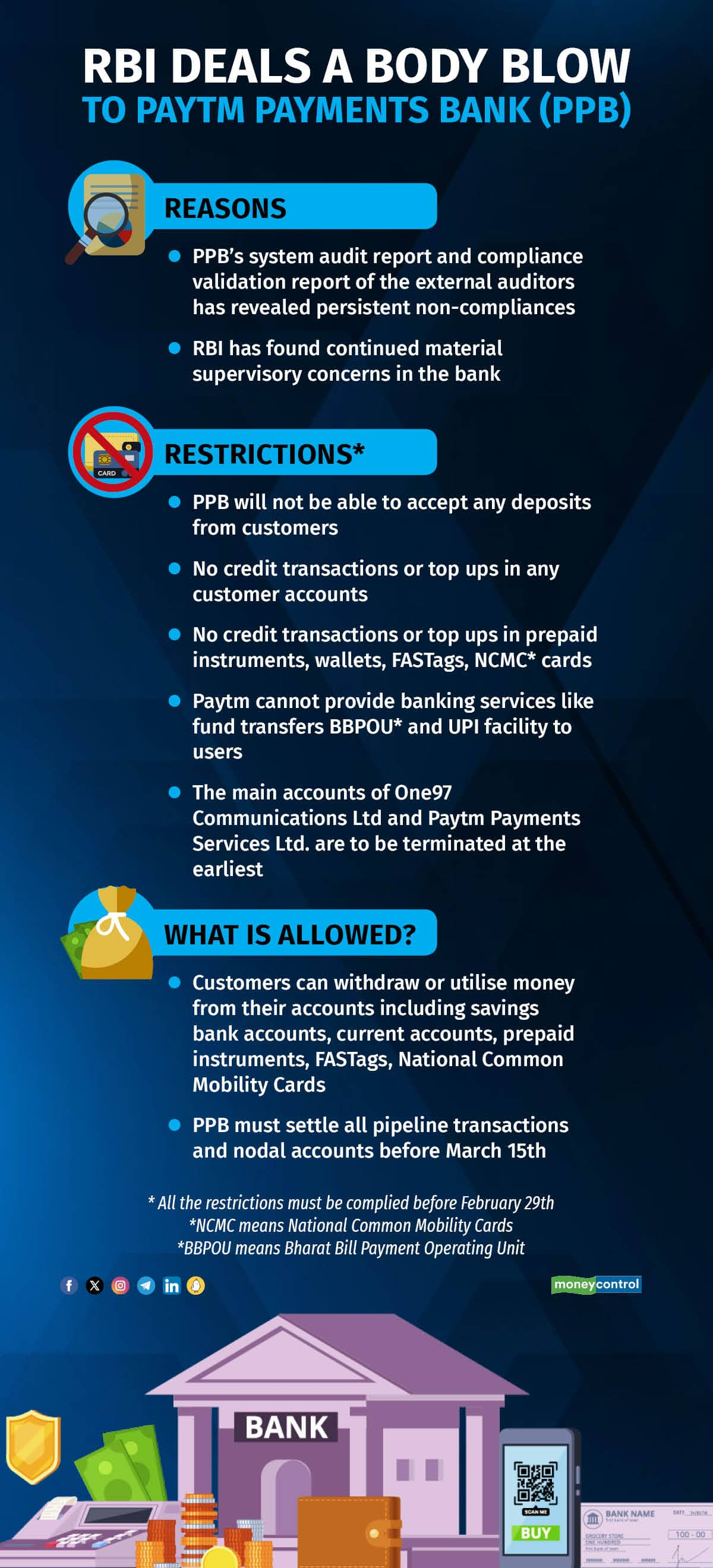



The Reserve Bank of India's (RBI) decision to prohibit Paytm Payments Bank Ltd (PPBL), the digital banking unit of One97 Communication, from offering all banking services has sent shockwaves across the fintech industry, with many terming it as one of the harshest decisions undertaken by the regulator against a fintech company in recent times.
In a notification issued on January 31, the regulator barred the payments bank from onboarding new customers and halting all its basic services, including UPI, Immediate Payment Service (IMPS), bill payments and accepting deposits, effective February 29.

While many are anticipating the diktat to be on embargo, hoping it to be lifted in the near future, others termed it as writing on the wall for the payments bank.
Even if the embargo gets lifted now, or Paytm manages to set the house right, PPBL will not be able to make up for the loss as customers would end up withdrawing all the deposits.
"It’s a sad day for fintechs. It is not very easy to work with the regulator, especially with so many norms. It gets confusing, if not supervised. RBI could have penalised them (Paytm) instead of destroying them completely," a lending head of a fintech firm said.
Another founder, requesting anonymity, said the move will destroy the spirit of the fintech sector and restrict newer players from coming into the banking business.
“This does not bode well for the industry. They may be a competitor but a move like this will reduce the trust that regulators have on fintechs and investors have in fintechs as well, in India,” said co-founder of a payment firm.
“Overall, the industry is very disappointed with a move like this. Hope there is more clarity on what the compliance issue is and whether it can be resolved,” he added.
One of the largest profitable payments banks, PPBL has been under fire after RBI noted “some material supervisory concerns” back in 2022.
The regulator barred PPBL, which had been eying for a Small Finance Bank (SFB) license, from onboarding new customers on March 11, 2022 and directed the firm to conduct a comprehensive audit of its IT system.
While Paytm claimed to be working in tandem with the RBI team to adhere to various recommendations as part of its IT review undertaken earlier in FY23, the regulator remained unsatisfied with the implementation.
As per experts, PPBL was found in violation of KYC norms, data storage, data privacy and outsourcing of the data.
“RBI had issues with PPBL’s IT system but had a larger concern with its KYC compliances,” a fintech investor alleged, requesting anonymity.
He continues, “Since PPBL had its own license, it had its own system and did not work with banks expect on a few services like RTGS (Real-Time Gross Settlement) etc. It had its own rails. It may have been leveraging its system for non-KYC accounts for other purposes, which came under the regulator’s radar.”
Nevertheless, fintech founders have expressed shock over the development, which may cause a ripple effect on the ecosystem.
“This is definitely a very serious action by the RBI. The reason is to do with some compliance issues with their system audit report. While their payments business or lending may not be impacted, this will have a ripple effect on the ecosystem,” a founder of a neobank said.
Many founders took to social media to express their views.
"Can't believe RBI would just go destroy a bank like this. When Yes Bank had much bigger issues they took over and got other banks to take over. To protect the system they ensured a smooth transition in 15 days. But now they prefer to let all the banks customers, vendors and partners suffer and create a confidence issue unnecessarily, and force the business down," said Deepak Shenoy, CEO, Capitalmind.
Co-founder at Indiagold and former Senior VP-Products at Paytm, Deepak Abbot, also came out in Paytm's support.
"Having seen @Paytm from inside and outside, they will come out lot stronger and better. All leading Banks line up to partner with One97 (Paytm). IMO, this will give One97 a much bigger opportunity to become a preferred platform for multiple banks' offerings in a single app," he added.
Meanwhile, Bernstein expects no immediate impact on Paytm’s UPI business that accounts for 70 percent of GMV, and the loan distribution business. However, risk overhangs on the payment margins, given some of the higher margin products (wallets, FasTag etc.) which are dependent on the Payments bank entity (PPBL).
“Overall this development highlights the regulatory overhang that surrounds Paytm model which in our view is the biggest risk for this business. And clearly Paytm is far from becoming a stable format (from a regulator’s perspective),” it said in a note.

Discover the latest Business News, Sensex, and Nifty updates. Obtain Personal Finance insights, tax queries, and expert opinions on Moneycontrol or download the Moneycontrol App to stay updated!